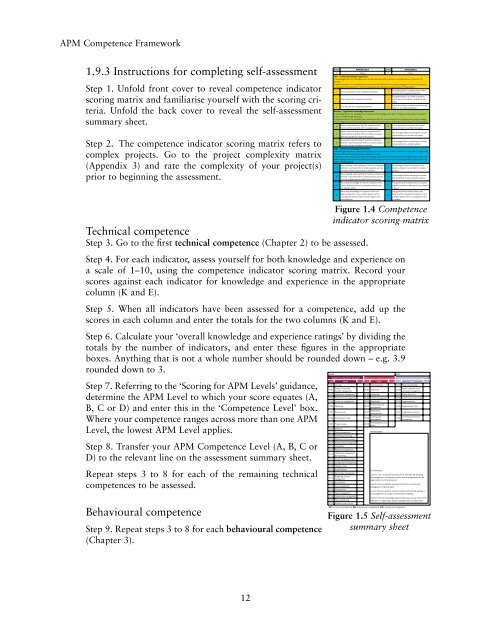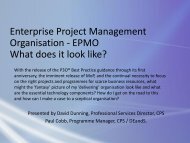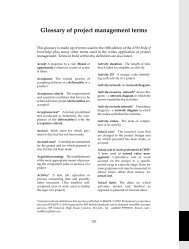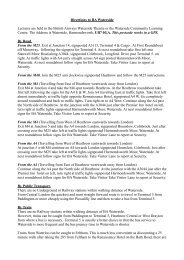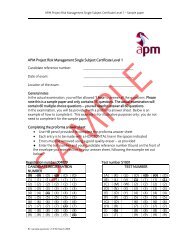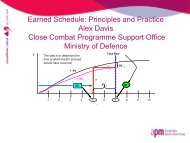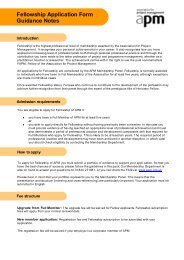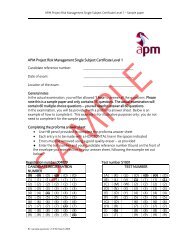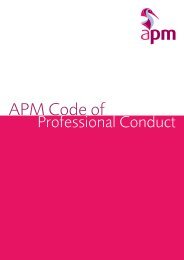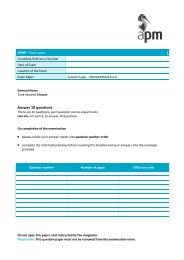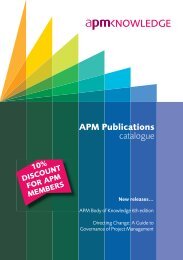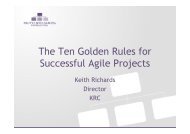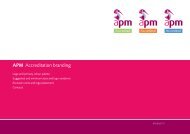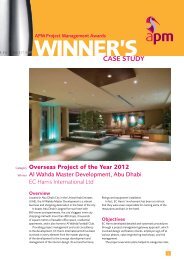apm competence framework - Association for Project Management
apm competence framework - Association for Project Management
apm competence framework - Association for Project Management
Create successful ePaper yourself
Turn your PDF publications into a flip-book with our unique Google optimized e-Paper software.
APM Competence Framework<br />
1.9.3 Instructions <strong>for</strong> completing self-assessment<br />
Step 1. Unfold front cover to reveal <strong>competence</strong> indicator<br />
scoring matrix and familiarise yourself with the scoring criteria.<br />
Unfold the back cover to reveal the self-assessment<br />
summary sheet.<br />
Step 2. The <strong>competence</strong> indicator scoring matrix refers to<br />
complex projects. Go to the project complexity matrix<br />
(Appendix 3) and rate the complexity of your project(s)<br />
prior to beginning the assessment.<br />
Figure 1.4 Competence<br />
indicator scoring matrix<br />
Technical <strong>competence</strong><br />
Step 3. Go to the first technical <strong>competence</strong> (Chapter 2) to be assessed.<br />
Step 4. For each indicator, assess yourself <strong>for</strong> both knowledge and experience on<br />
a scale of 1–10, using the <strong>competence</strong> indicator scoring matrix. Record your<br />
scores against each indicator <strong>for</strong> knowledge and experience in the appropriate<br />
column (K and E).<br />
Step 5. When all indicators have been assessed <strong>for</strong> a <strong>competence</strong>, add up the<br />
scores in each column and enter the totals <strong>for</strong> the two columns (K and E).<br />
Step 6. Calculate your ‘overall knowledge and experience ratings’ by dividing the<br />
totals by the number of indicators, and enter these figures in the appropriate<br />
boxes. Anything that is not a whole number should be rounded down – e.g. 3.9<br />
rounded down to 3.<br />
Step 7. Referring to the ‘Scoring <strong>for</strong> APM Levels’ guidance,<br />
determine the APM Level to which your score equates (A,<br />
B, C or D) and enter this in the ‘Competence Level’ box.<br />
Where your <strong>competence</strong> ranges across more than one APM<br />
Level, the lowest APM Level applies.<br />
Step 8. Transfer your APM Competence Level (A, B, C or<br />
D) to the relevant line on the assessment summary sheet.<br />
Repeat steps 3 to 8 <strong>for</strong> each of the remaining technical<br />
<strong>competence</strong>s to be assessed.<br />
Behavioural <strong>competence</strong><br />
Step 9. Repeat steps 3 to 8 <strong>for</strong> each behavioural <strong>competence</strong><br />
(Chapter 3).<br />
NAME:<br />
Score KNOWLEDGE Score EXPERIENCE<br />
0 None 0 None<br />
Low – Limited knowledge/experience<br />
In knowledge terms: the candidate knows the element and is able to present and explain known criteria <strong>for</strong> this<br />
element.<br />
In experience terms: the candidate has some experience obtained from a project management role in a few projects<br />
in one sector of the economy or unit of an organisation during one or several phases of these projects.<br />
Has participated in a single project which<br />
1 Has an awareness of the <strong>competence</strong> element. 1<br />
involved the <strong>competence</strong> element.<br />
Has participated in a number of projects<br />
2 Knows about the <strong>competence</strong> element. 2 which have involved the <strong>competence</strong> element.<br />
Has practised the <strong>competence</strong> element with<br />
3 Can describe the <strong>competence</strong> element. 3<br />
others in a number of projects.<br />
Medium – Significant knowledge/experience<br />
In knowledge terms: the candidate has a solid level of knowledge and is able to recognise and to apply the relevant<br />
criteria, as well as check the results.<br />
In experience terms: the candidate has experience and a track record obtained from applying many project management<br />
<strong>competence</strong>s across several projects in at least one sector of the economy during most phases of these projects.<br />
Has an understanding of how the <strong>competence</strong> element<br />
could be practised within a single project.<br />
tence element in a number of projects.<br />
Has independently practised the compe-<br />
4<br />
4<br />
Has an understanding of how the <strong>competence</strong> element<br />
could be practised within a number of projects 5<br />
Has managed others practising the <strong>competence</strong><br />
element in a number of projects.<br />
5<br />
and can evaluate the value to the projects.<br />
Has a good understanding of how the <strong>competence</strong><br />
Has managed others practising the <strong>competence</strong><br />
element in a complex project.<br />
6 element could be practised within a complex project 6<br />
and can evaluate and adapt as required.<br />
High – Extensive knowledge/experience<br />
In knowledge terms: the candidate understands the role in detail and is able to evaluate, to create and to integrate the<br />
relevant criteria and can interpret and evaluate the results.<br />
In experience terms: the candidate has a broad range of experience and a good track record gained from responsible<br />
project management roles in many different kinds of projects across one or more industry sectors, during most or all<br />
phases of these projects.<br />
Has a detailed understanding of how the <strong>competence</strong><br />
Has managed others practising the <strong>competence</strong><br />
element in a number of complex<br />
7 element is practised within complex projects and can 7<br />
critically evaluate and optimise as required.<br />
projects.<br />
Has a detailed understanding of how the <strong>competence</strong><br />
Has managed others practising the <strong>competence</strong><br />
element in many complex projects.<br />
8 element is practised within complex projects and can 8<br />
critically evaluate and develop further as required.<br />
Has a deep knowledge of how the <strong>competence</strong> element<br />
is practised within very complex projects and 9 ing the <strong>competence</strong> element in very complex<br />
Has guided and facilitated others in practis-<br />
9<br />
can educate others.<br />
projects.<br />
Has a deep knowledge of all aspects of the <strong>competence</strong><br />
element in very complex projects and is<br />
aspects of the <strong>competence</strong> element in very<br />
Has guided and facilitated others in all<br />
10<br />
10<br />
a recognised industry expert (written papers and<br />
complex projects and is a recognised industry<br />
presentations).<br />
expert.<br />
Figure 1.5 Self-assessment<br />
summary sheet<br />
DATE:<br />
Technical <strong>competence</strong> elements Behavioural <strong>competence</strong> elements Contextual <strong>competence</strong> elements<br />
Code Name Rating Code Name Rating Code Name Rating<br />
TC01 Concept<br />
BC01 Communication<br />
CC01 <strong>Project</strong> sponsorship<br />
<strong>Project</strong> success and<br />
Health, safety and environmental<br />
TC02<br />
BC02 Teamwork CC02<br />
benefits management<br />
management<br />
TC03 Stakeholder management BC03 Leadership CC03 <strong>Project</strong> life cycles<br />
TC04 Requirements management BC04 Conflict management CC04 <strong>Project</strong> finance and funding<br />
TC05 <strong>Project</strong> risk management BC05 Negotiation CC05 Legal awareness<br />
TC06 Estimating<br />
Human resource<br />
BC06<br />
CC06 Organisational roles<br />
management<br />
TC07 Business case BC07 Behavioural<br />
CC07 Organisation structure<br />
characteristics<br />
Learning and<br />
Governance of project<br />
TC08 Marketing and sales BC08 CC08<br />
development<br />
management<br />
TC09 <strong>Project</strong> reviews<br />
Professionalism and<br />
BC09<br />
ethics<br />
TC10 Definition<br />
TC11 Scope management<br />
Personal notes:<br />
TC12 Modelling and testing<br />
TC13 Methods and procedures<br />
TC14 <strong>Project</strong> quality management<br />
TC15 Scheduling<br />
TC16 Resource management<br />
In<strong>for</strong>mation management<br />
TC17<br />
and reporting<br />
TC18 <strong>Project</strong> management plan<br />
TC19 Configuration management<br />
TC20 Change control<br />
TC21 Implementation<br />
For Reference:<br />
TC22 Technology management<br />
Level A: Can successfully execute all the indicators by directing<br />
Budgeting and cost<br />
the management of complex projects and/or programmes <strong>for</strong> an<br />
TC23<br />
management<br />
organisation or a functional unit.<br />
TC24 Procurement<br />
Level B: Has successfully executed most of the indicators by<br />
TC25 Issue management<br />
managing a complex project.<br />
TC26 Development<br />
Level C: Has successfully executed at least some of the indicators<br />
TC27 Value management<br />
by management of a project with limited complexity.<br />
TC28 Earned value management<br />
Level D: Has the knowledge required and may execute some of the<br />
TC29 Value engineering<br />
indicators in supporting a project manager and/or project team.<br />
TC30 Handover and closeout<br />
TC: technical <strong>competence</strong>; BC: behavioural <strong>competence</strong>; CC: contextual <strong>competence</strong>.<br />
12


